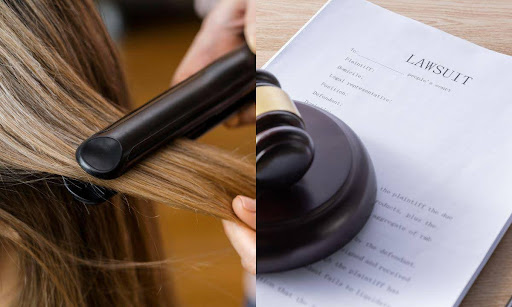In the world of beauty and personal care, hair relaxers have long stood out for their ability to transform curly and coarse hair into smooth, straight locks. Cherished by many for their effectiveness, these products have become a staple in beauty routines across the globe.
However, amidst their popularity, a pressing controversy looms: a link between chemical hair relaxer use and the risk of cancer.
Chemical hair relaxer use and the risk of cancer
This growing concern has captured the medical community’s attention and paved the way for chemical hair relaxer cancer lawsuits, highlighting a critical intersection of health and legal considerations.
For individuals who may face a cancer diagnosis potentially linked to these products, it’s essential to understand both the medical implications and the legal rights that could be involved in such a scenario.
What Are Hair Relaxers?
Hair relaxers are chemical-based products designed to straighten curly or unmanageable hair permanently. Originating in African American communities as a means to emulate smoother hair textures, they have gained global popularity, transcending cultural and racial boundaries.
Historically, these products represent a beauty choice and a complex weave of cultural identity and aesthetic preferences. Common ingredients in hair relaxers include:
- Sodium hydroxide (lye) or calcium hydroxide (no-lye) to alter the hair’s structure
- Emollients and moisturizers, like petrolatum, minimize scalp irritation
- Conditioning agents to counteract the harsh effects of the chemicals on hair
The Scientific Evidence
A pivotal study published in the Journal of the National Cancer Institute found a notable correlation between frequent use of hair relaxers and an increased risk of breast cancer. Another significant piece of research highlighted a possible connection with uterine cancer, raising questions about the long-term safety of these products.
However, these findings are not conclusive. Experts caution about the limitations of current research, which include small sample sizes, short follow-up durations, and potential confounding factors. There’s also a need for more diverse demographic representation in these studies to accurately assess risks across different populations.
Medical experts urge a balanced view. While these studies provide valuable insights, they do not establish a direct cause-and-effect relationship. The complexity of cancer, influenced by a myriad of genetic, environmental, and lifestyle factors, makes it challenging to isolate the impact of hair relaxers.
Therefore, while the evidence suggests a potential risk, more comprehensive research is needed for definitive conclusions.
Understanding the Risks
Hair relaxers, while effective for hair straightening, carry potential risks due to their chemical composition. The frequency of use significantly amplifies these risks. Regular application, common among users seeking to maintain straight hair, leads to repeated exposure to potentially harmful chemicals. These chemicals can be absorbed through the scalp, introducing them into the body’s system.
A recent study indicated that women who use hair relaxers more than four times a year might have a higher risk of developing certain types of cancer compared to infrequent users or non-users. This statistic underlines the importance of understanding and moderating the use of these products.
Compared to other beauty products, hair relaxers contain a unique chemical blend that makes them more potent. For instance, while hair dyes and nail polishes also contain chemicals, the method of application and the types of chemicals used in hair relaxers potentially pose a higher risk due to direct and prolonged scalp exposure.
This comparison highlights the need for consumers to be extra cautious with products with closer and more frequent contact with the skin and scalp.
What Should I Do If I Am Diagnosed with Cancer and Use a Hair Relaxer?
Immediate steps after diagnosis:
- Seek Medical Advice
Upon receiving a cancer diagnosis, the first step is to seek comprehensive medical advice. This involves discussing treatment options, understanding the specific type and stage of cancer, and planning the best course of action. Cancer is a complex disease, and each case requires a tailored approach to treatment and care.
- Documenting Hair Relaxer Usage
It’s crucial to document your history of hair relaxer use. This includes the frequency of use, duration (how long you’ve been using these products), and the specific brands or types of relaxers. This information can be vital in understanding the potential connection between your cancer diagnosis and hair relaxer usage.
- Seeking Legal Counsel
If you suspect that your cancer may be linked to hair relaxer use, understanding your legal rights becomes essential.
Understanding Legal Rights and Compensation
An attorney can help you understand your rights, especially if there’s evidence suggesting a link between your cancer and the hair relaxer. They can guide you through the complexities of product liability and negligence laws.
Exploring Product Liability and Negligence
Your attorney will explore whether the product manufacturer failed to warn users about the potential risks or if there was any negligence in the product’s formulation.
Consulting an Experienced Attorney
It’s important to consult an attorney who has experience in similar cases. They can provide insights into the likelihood of a successful legal claim and the process involved. This can include gathering evidence, filing a lawsuit, and potentially seeking compensation for medical expenses, suffering, and other damages.
Conclusion
While hair relaxers offer aesthetic benefits, they come with potential health risks, as proved by recent studies linking them to cancer. Understanding these risks is crucial for making informed decisions about personal beauty routines. Users must stay informed and vigilant due to the potential health and legal implications.
If you’re concerned about the impact of hair relaxer use on your health or face a related medical diagnosis, seeking professional advice is essential. Consulting both medical professionals and legal experts can provide guidance and support in navigating these complex issues.
Also Read: 17 Types of highlights for every Hair Type


